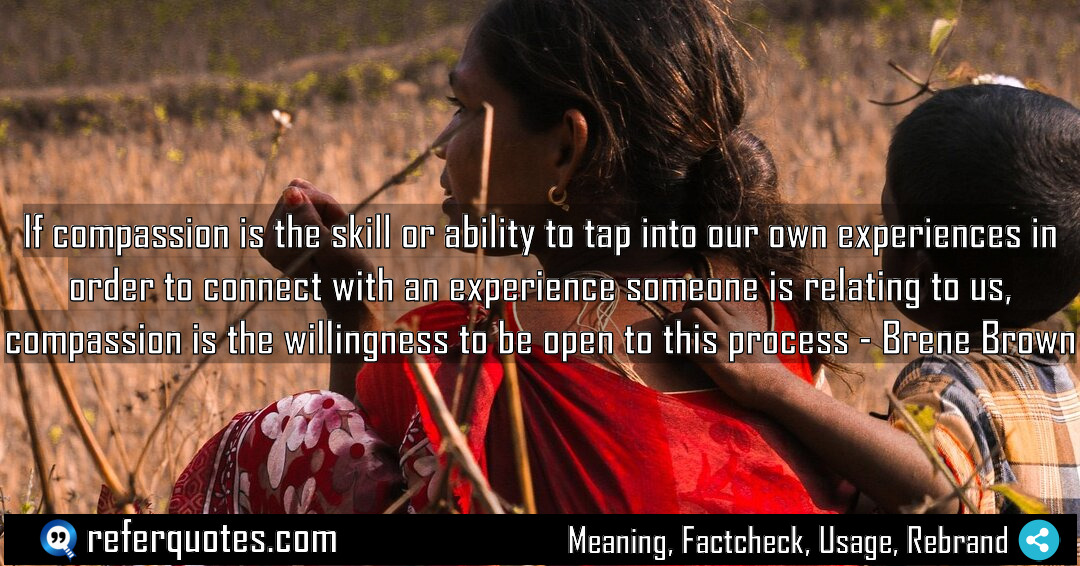
If compassion is the skill or ability to tap… it’s really about a willingness to be open. It’s not just a feeling; it’s an active, courageous choice we make to connect.
Share Image Quote:
Table of Contents
Meaning
Compassion is an active skill, not a passive feeling, powered by our willingness to be emotionally available.
Explanation
Here’s the thing most people get wrong. They think compassion is just about feeling sorry for someone. But what Brené is pointing to is so much more powerful. It’s a two-part process. First, you have to have the skill—the ability to actually dig into your own emotional memory bank and find a similar feeling. That’s the “tap into our own experiences” part. But the real magic, the part that most of us shy away from, is the second part: the willingness. The courage to stay open and let that connection happen, even when it’s uncomfortable, even when we want to shut down or offer a quick fix instead. It’s the difference between knowing how to swim and being willing to jump into the cold water to help someone.
Quote Summary
Reading Level55
Aesthetic Score62
Origin & Factcheck
This quote comes directly from Brené Brown’s 2004 book, Women & Shame: Reaching Out, Speaking Truths, which was published in the United States. It’s a core concept from her early research, before she became a global phenomenon with her TED talks.
Attribution Summary
Author Bio
Dr Brene Brown is the author of books such as Daring Greatly and The Power of Vulnerability. The TED talk and Netflix production based on her research reached out to millions of audience. She researches effects of courage and vulnerability in shaping people's work and relationships. She leads the Brené Brown Education and Research Group and provides evidence-based insights into practical tools to help people train themselves
Official Website |Facebook | X | Instagram | YouTube |
Where is this quotation located?
| Quotation | If compassion is the skill or ability to tap into our own experiences in order to connect with an experience someone is relating to us, compassion is the willingness to be open to this process |
| Book Details | Publication Year: 2004; (other edition details unknown) |
| Where is it? | Chapter/Section unknown |
Context
Brown places this definition squarely within her research on shame and vulnerability, particularly for women. She’s arguing that compassion isn’t a soft, fluffy emotion we’re just born with. In the landscape of shame, it’s a critical, brave action—a form of “reaching out” that requires us to be vulnerable ourselves in order to truly sit with someone in their struggle.
Usage Examples
Let’s get practical. How do you actually use this?
- For a leader managing a stressed-out team: Instead of just saying “I understand the deadline is tough,” you could connect it to a time you felt completely overwhelmed on a project. That shared feeling of pressure creates a real bond.
- For a friend going through a breakup: Resist the urge to immediately problem-solve (“You’ll find someone better!”). Instead, be willing to recall your own heartache and just sit with them in that sad, messy place. That’s the “willingness to be open.”
- For a coach or therapist: This is your foundational principle. Actively listen for the underlying emotion a client is describing and be willing to connect it to a universal human feeling you’ve experienced, even if the situations are different.
To whom it appeals?
Share This Quote Image & Motivate
Motivation Score68
Popularity Score75
Shareability Score72
Common Questions
Question: What’s the difference between empathy and compassion based on this quote?
Answer: Great question. Think of empathy as the first part—the ability to feel with someone. Compassion, in Brown’s definition, adds the crucial layer of willingness. It’s empathy plus the brave choice to engage with that feeling.
Question: Does this mean I have to have experienced the exact same thing to be compassionate?
Answer: Not at all. You don’t need the same story. You just need to have felt a similar emotion. You haven’t lost a parent, but you know what deep loss feels like. You haven’t been laid off from that job, but you know the sting of rejection. Tap into that.
Question: What if I’m not willing to be open? Does that make me a bad person?
Answer: Absolutely not. It makes you human. This willingness is a muscle. It takes practice and it’s often scary because it requires vulnerability. The goal isn’t perfection; it’s just recognizing the choice and maybe being willing to try a little more often.
Similar Quotes
Compassion is not a trait we have or do not have. It’s a daily practice that reshapes our entire perspective, turning empathy from a feeling into a consistent, world-changing action.…
You know, when Brene Brown says “Compassion is not a virtue — it is a commitment,” she’s really flipping the script on how we see empathy. It’s not some magical…
You know, the roots of compassion lie in recognizing our shared suffering. It’s not about pity, but seeing your own struggles in others. This simple shift changes everything about how…
Meditation is the training ground for compassion because it fundamentally rewires your brain’s default reactions. It’s not about emptying your mind, but building the mental muscle to hold space for…
You know, “Children learn compassion when they experience it” is one of those quotes that flips your whole perspective on parenting. It’s not about lecturing kids, but about embodying the…
